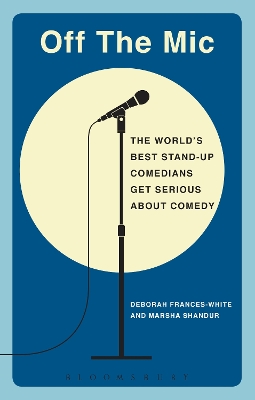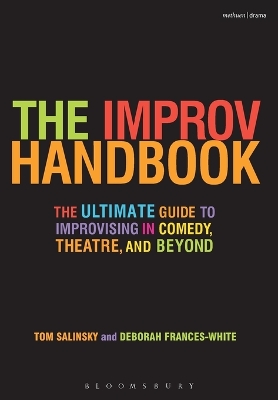Performance Books
2 total works
What is it to be a stand-up comedian? To be funny, solo? You have no character-role, no double-act partner, and nowhere to look but out into the darkness, with just a microphone, an audience and your imagination.
This is a job without an annual appraisal; a job where you are publicly appraised every ten seconds. The results are harsh and obvious: if the audience isn't laughing, you 'died'; if they can't stop, you 'killed'.
Deborah Frances-White and Marsha Shandur unpack the inner-workings of the minds of comics, sharing their secrets, insecurities and successes; their betes noires and their biggest fears. Featuring interviews with a host of comedians including Eddie Izzard, Moshe Kasher, Sarah Millican, Jim Jeffries, Stewart Lee, Lewis Black, Jenny Eclair, Todd Barry, Richard Herring, Marc Maron, Stephen K Amos, Rich Hall, Zoe Lyons, Marcus Brigstocke, Phill Jupitus, Gary Delaney, Mark Watson, Greg Davies and many more, this excellent book lets you in to the hearts and minds of celebrated comedians, away from the stage and off the mic.
This is a job without an annual appraisal; a job where you are publicly appraised every ten seconds. The results are harsh and obvious: if the audience isn't laughing, you 'died'; if they can't stop, you 'killed'.
Deborah Frances-White and Marsha Shandur unpack the inner-workings of the minds of comics, sharing their secrets, insecurities and successes; their betes noires and their biggest fears. Featuring interviews with a host of comedians including Eddie Izzard, Moshe Kasher, Sarah Millican, Jim Jeffries, Stewart Lee, Lewis Black, Jenny Eclair, Todd Barry, Richard Herring, Marc Maron, Stephen K Amos, Rich Hall, Zoe Lyons, Marcus Brigstocke, Phill Jupitus, Gary Delaney, Mark Watson, Greg Davies and many more, this excellent book lets you in to the hearts and minds of celebrated comedians, away from the stage and off the mic.
"The Improv Handbook" is a great new guide that covers the history of improvisation and includes chapters on spontaneity and the fundamentals of storytelling.Although there are already several successful books on the market about the theory and practice of improvised theatre, there's nothing comprehensive, helpful, fun and full of experience and advice."The Improv Handbook" is a great new guide from a husband and wife team who have years of studying, performance and teaching behind them. Beginning with a history of improvisation, the book works through different types of format and performance including TheatreSports and the inventions of Keith Johnstone and Del Close. The core section of the book is called, simply, "How To Improvise" and includes chapters on spontaneity, the fundamentals of storytelling, working together, upping the ante and characters.Having established the fundamentals, the two authors go on to elaborate on more advanced techniques and skills. The book concludes with sections on how to improvise in front of an audience and - just as crucially - how to attract an audience in the first place."
The Improv Handbook" should become a standard book in the field - it's smart, fun, helpful, and inspiring, and it's on a mission to bring Improv to a much wider audience.
The Improv Handbook" should become a standard book in the field - it's smart, fun, helpful, and inspiring, and it's on a mission to bring Improv to a much wider audience.

